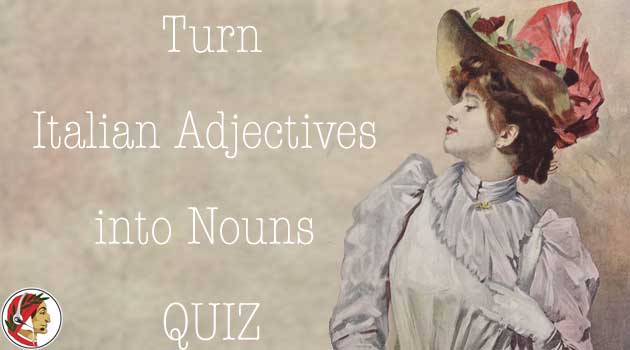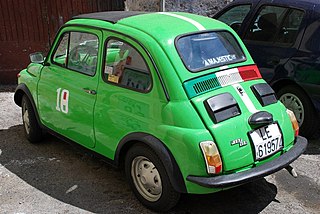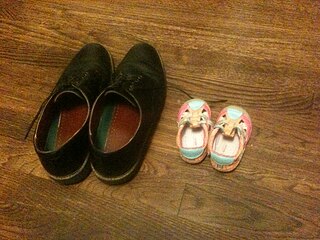Learn how to turn Italian Adjectives into nouns with a simple guide and a quiz
Look at the example:
- alto —> altezza
In this case, the suffix –ezza changes the adjective alto into the noun altezza.
Let’s learn all the suffixes (in Italian suffissi) we can use for this purpose.
This is the first blog dedicated to Italian suffissi and their role in changing the function of words.
The final quiz consists of 50 adjectives that you will have to convert into nouns, following the patterns below. In accordance to the meaning of the suffix, you can obtain multiple nouns from the same adjective. For example:
- alto —> altitudine
Altezza and altitudine have different meanings and both can be linked back to the adjective “alto”.
Look up the meaning of new words and feel free to add your comments. If you added a valid noun which is not included in the quiz, please write it in the comments and I’ll add it if it makes sense.
Let’s begin
- –ezza
bello —> bellezza
triste —> tristezza
fermo —> fermezza
dolce —> dolcezza
- –ìa (emphasis on “i”) Abstract nouns.
geloso —> gelosia
cortese —> cortesia
folle —> follia
malato —> malattia
- –ia (emphasis on other syllables) Abstract nouns.
feroce —> ferocia
sagace —> sagacia
efficace —> efficacia
tenace —> tenacia
- –ìzia / –uzia (emphasis on the penultimate syllable)
furbo —> furbizia
avaro —> avarizia
astuto —> astuzia
primo —> primizia
- –ità, –età, –tà (emphasis on the final “à”)
capace —> capacità
fedele —> fedeltà
sobrio —> sobrietà
buono —> bontà
- –tudine
solo —> solitudine
simile —>similitudine
retto —>rettitudine
consueto —> consuetudine
- –ura
bravo —> bravura
rotto —> rottura
cotto —> cottura
fritto —> frittura
- –aggine
stupido —> stupidaggine
testardo —> testardaggine
lungo —> lungaggine
balordo —> balordaggine
- –eria (emphasis on “I”)
sciatto —> sciatteria
carino —> carineria
cretino —> cretineria
galante —> galanteria
- –ume – masculine
sudicio —> sudiciume
piatto —> piattume
dolce —> dolciume
marcio —> marciume
- –anza / –enza – feminine
Those come from adjectives –ante / –ente.
arrogante —> arroganza
intelligente —> intelligenza
competente —> competenza
sapiente —> sapienza
- –ismo – masculine
assente —> assenteismo
assoluto —> assolutismo
perfetto —> perfezionismo
fatale —> fatalismo
These are just a few examples of Italian adjectives turning into nouns. If their meaning isn’t clear, we can talk about it in class. Alla prossima!
- 1
- Answered
- Review
-
1. Question
Adjectives to Nouns. 50 examples
Italian Suffissi – Lesson 1
Look at the examples above and write the correspondent nouns
PLEASE NOTE
If you don’t have an Italian keyboard, write the letter à or add an apostrophe to a regular a’.
serenità = serenita’
both versions will be counted as correct.
-
- generoso --->
- gentile --->
- altruista --->
- buono --->
- dolce --->
- spensierato --->
- severo --->
- allegro --->
- egoista --->
- superficiale --->
- vanitoso --->
- sincero --->
- falso --->
- timido --->
- crudele --->
- solitario --->
- maturo --->
- spigliato --->
- prudente --->
- pigro --->
- malinconico --->
- invidioso --->
- onesto --->
- aggressivo --->
- noioso --->
- simpatico --->
- ingenuo --->
- pessimista --->
- ottimista --->
- insicuro --->
- testardo --->
- socievole --->
- avaro --->
- romantico --->
- importante --->
- diligente --->
- amaro --->
- scortese --->
- sofferente --->
- intelligente --->
- razzista --->
- ostile --->
- libero --->
- trasparente --->
- coerente --->
- piacevole --->
- reale --->
- eccitato --->
- retto --->
- infetto --->
-
Painting: Juana Romani – Couverture Paris Noël – 1894







